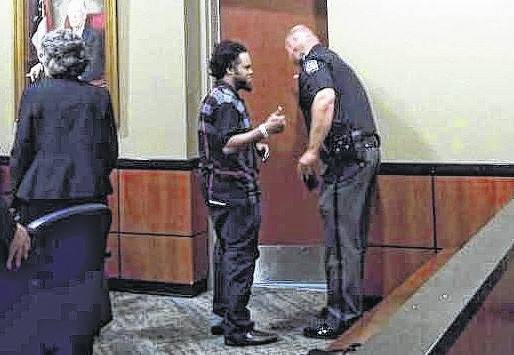ROCKINGHAM — Derrick McRae will have the right to go before a parole board in 2021 — 25 years after his arrest in the 1995 shooting death of Jeremy Lee Rankin.
After hearing two days of detailed testimony on McRae’s childhood struggles, diagnosis of schizophrenia and nonviolent prison life, Superior Court Judge David Lee ruled Thursday that McRae’s original sentence of life without the possibility of parole should be voided. McRae received the sentence in 1998, after undergoing two trials in three weeks.
“I conclude (that) it’s a matter of law that the defendant should be sentenced to life in prison with the possibility of parole,” Lee proclaimed, emphasizing the word “with.”
The pronouncement so shocked McRae’s sister, Marnell Gould, that she broke out in gasping sobs, forcing Lee to order her from the courtroom. Others in McRae’s family wept quietly, including his oldest brother, Tony Jackson.
Ticking off a list of “mitigating factors” set by state statute in 2012, Lee ruled that McCrae’s lack of maturity and intelligence, combined with his diagnosis of schizophrenia, did not render him “irreparably corrupt” — the definition of someone who should be denied the chance at parole.
Rather, Lee ruled, McRae, 38, had suffered setbacks in physical and mental development as the result of a tumultuous upbringing and a sustained lack of “guidance or control.” Even his juvenile crimes — property damage, breaking and entering, and simple assault — appeared to stem from “a lack of positive influences,” the judge said.
Besides that, Lee said, “we now have the benefit of retrospective analysis” — i.e., hindsight — to show “that he was, at the time of the crime, in the onset of schizophrenia.”
McRae was 16 at the time of Rankin’s murder. He was not diagnosed with schizophrenia until he was incarcerated, although he had displayed signs of the disease that also plagued his father.
“I can’t talk,” McRae’s mother, Gloria Pratt, said after the hearing. “I’m just thankful to God.”
Jackson said he was “truly grateful for the Innocence Project” and its work on McRae’s case. He referred to what now is the Wrongful Convictions Clinic of the Duke University School of Law. Two lawyers and one third-year student from the project — Jamie Lau, Theresa Newman and Mason Roberts, respectively — represented McRae.
In a 2012 U.S. Supreme Court case, justices ruled that states must be meticulously careful to consider the cases of juvenile defendants individually. After that ruling, North Carolina legislators listed a set of circumstances that could mitigate — or be used as a reason to lessen — strict sentences.
In 2016, the Supreme Court ruled that sentencing juveniles to life without parole was cruel and, thus, unconstitutional.
During this week’s hearings, the Duke team argued that North Carolina did not have the constitutional right to impose McRae’s initial sentence, but Lee refused to rule on that contention. Instead, he had the lawyers focus only on state statute.
Richmond County District Attorney Reece Saunders presented the case for the prosecution.
“You’re looking at the possibility of Mr. McRae coming back into the community” if he ever receives parole, Saunders said Thursday. “I just fear for what could happen.”

